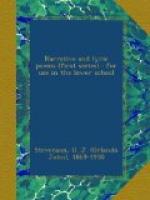They three, in that long-distant summer-time— 625
The castle, and the dewy woods, and hunt
And hound, and morn on those delightful hills
In Ader-baijan. And he saw that youth,
Of age and looks to be his own dear son,
Piteous and lovely, lying on the sand, 630
Like some rich hyacinth, which by the scythe
Of an unskilful gardener has been cut,
Mowing the garden grass-plots near its bed,
And lies, a fragrant tower of purple bloom,
On the mown, dying grass;—so Sohrab lay, 635
Lovely in death, upon the common sand.
And Rustum gaz’d on him with grief, and said:—
“O Sohrab, thou indeed art such
a son
Whom Rustum, wert thou his, might well
have lov’d!
Yet here thou errest, Sohrab, or else
men 640
Have told thee false;—thou
art not Rustum’s son.
For Rustum had no son: one child
he had—
But one—a girl; who with her
mother now
Plies some light female task, nor dreams
of us—
Of us she dreams not, nor of wounds, nor
war.” 645
But Sohrab answer’d him in wrath;
for now
The anguish of the deep-fix’d spear
grew fierce,
And he desired to draw forth the steel,
And let the blood flow free, and so to
die,
But first he would convince his stubborn
foe— 650
And, rising sternly on one arm, he said:—
[Sohrab discloses the mark by which he was to be known. “O boy—thy father!”]
“Man, who art thou who dost deny
my words?
Truth sits upon the lips of dying men,
And Falsehood, while I liv’d, was
far from mine.
I tell thee, prick’d upon this arm
I bear 655
That seal which Rustum to my mother gave,
That she might prick it on the babe she
bore.”
He spoke: and all the blood left
Rustum’s cheeks;
And his knees totter’d, and he smote
his hand,
Against his breast, his heavy mailed hand,
660
That the hard iron corslet clank’d
aloud;
And to his heart he press’d the
other hand,
And in a hollow voice he spake, and said:—
“Sohrab, that were a proof which
could not lie.
If thou shew this, then art thou Rustum’s
son.” 665
Then, with weak hasty fingers, Sohrab
loos’d
His belt, and near the shoulder bar’d
his arm,
And shew’d a sign in faint vermilion
points
Prick’d: as a cunning workman,
in Pekin,
Pricks with vermilion some clear porcelain
vase, 670
An emperor’s gift—at
early morn he paints,
And all day long, and, when night comes,
the lamp
Lights up his studious forehead and thin
hands:—
So delicately prick’d the sign appear’d[42]
On Sohrab’s arm, the sign of Rustum’s
seal. 675
It was that griffin, which of old rear’d




